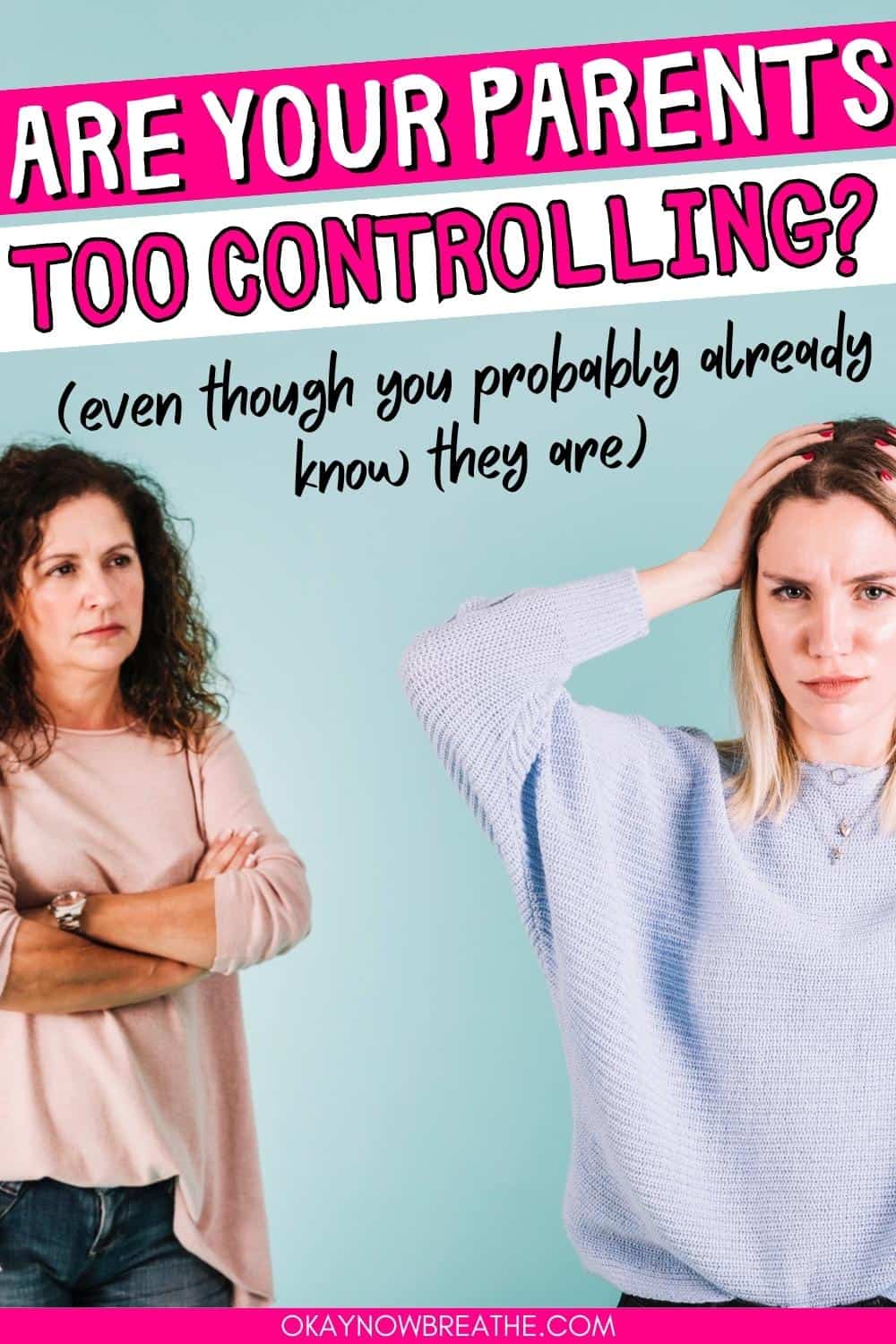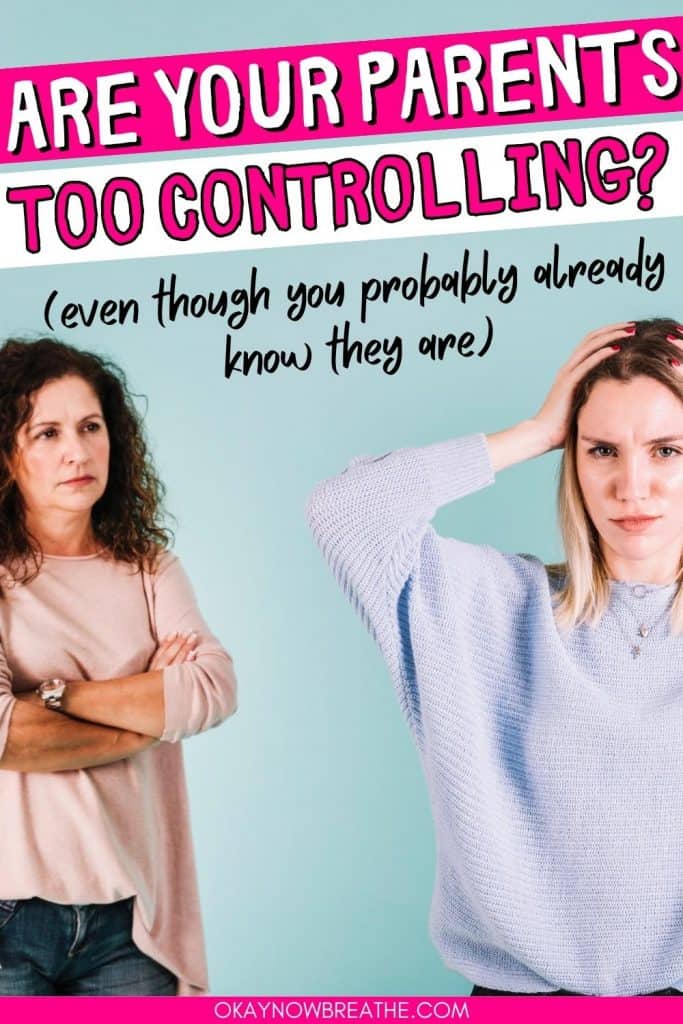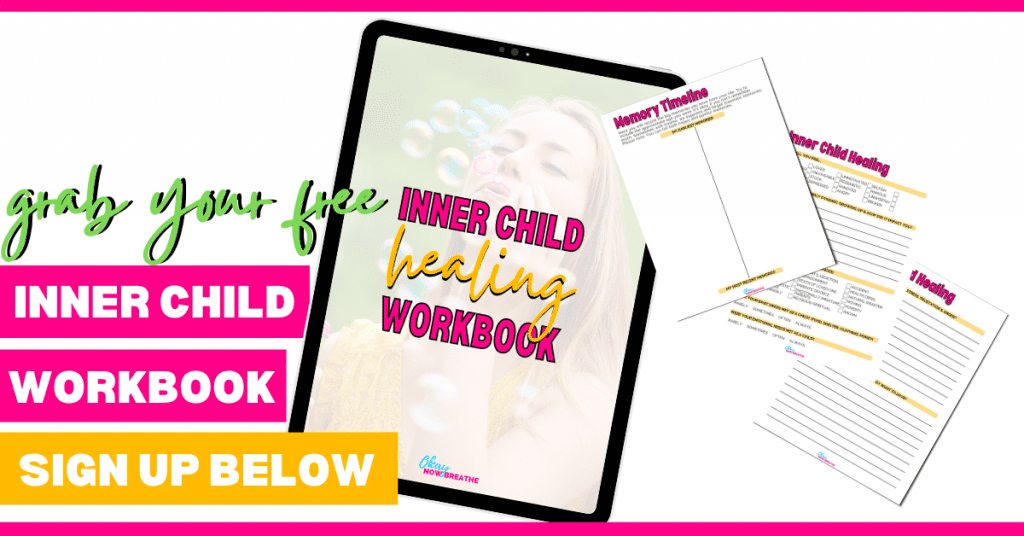
DISCLOSURE: I am not a mental health professional. If you need help finding a mental health care provider, call 1-800-662-HELP (4357) or visit Online Therapy to call, message, or video chat a certified therapist online. This post contains affiliate links. As an Amazon Associate, I earn from qualifying purchases. I may also receive compensation from Online Therapy or other sources if you purchase products or services through the links provided on this page. You can read my full disclaimer.
Signs of Controlling Parents in Adulthood
Do you feel like your parents are always breathing down your neck? Do they make all your decisions for you — even though you’re an adult?
If you feel like your parents are controlling your every waking moment, you are not alone.
It’s important to recognize these 13 signs of controlling behavior, so you can take the healing steps to gain your independence.
Damaging Consequences of Controlling Parents
The consequences of parental control can be damaging to your relationships, sense of autonomy, and overall wellbeing.
Here are some common consequences of parental control:
➡️ Strained Relationships: Because your relationships with your parents can be strained, it can also make it difficult for you to form healthy relationships with others.
➡️ Lack of Autonomy: It can be challenging for you to establish a healthy sense of autonomy and independence. It can make you feel like you are not in control of your own life.
➡️ Emotional Distress: Parental control can cause emotional distress, such as anxiety, depression, and low self-esteem.
➡️ Stress and Burnout: If you are constantly trying to meet your mom’s and dad’s expectations, you can feel incredibly stressed and burned out.
➡️ Guilt-Tripping: Controlling parents may use guilt-tripping as a means of control. They may make you feel guilty for not complying with their wishes.
➡️ Loss of Identity: Parental control can make it near impossible for you to establish your own values and passions. It can make you feel like you are living someone else’s life.
If you’re an adult still living in your parent’s house, it can be especially difficult to establish your own sense of identity while dealing with controlling parents.
However, it is important to remember that it is your birthright to make your own decisions and live life on your own terms.
✨ Speaking of having controlling parents, have you downloaded your free inner child healing workbook yet? 👇
13 Signs Your Parents Are Controlling
1. YOUR PARENT REFUSES TO BELIEVE YOU’RE GROWN
Coming out of the parent-child dynamic can be difficult for both parties to navigate.
But when your parents still treat you like a child no matter how old you get, this controlling dynamic can stifle independence and personal growth.
Signs parents don’t respect you as you age ⤵️
- Don’t give you the independence and autonomy
- Give you unsolicited advice and make decisions for you
- Disregard your opinions or feelings
- Don’t listen to your perspective and instead prioritize their own beliefs or ideas
- Control your actions and monitor your behavior
This parent/adult child dynamic gets even messier when you go on to have your own children, and your parents believe their parenting is the only correct way — which is simply not true.
Is your parent toxic?
👉 17 Signs a Parent is Toxic (That are Painfully Relatable)
2. YOUR PARENT HAS UNREASONABLE RULES
Your parents may have enforced unrealistic expectations and rules from childhood, adolescence, and now into adulthood.
Examples of unreasonable rules ⤵️
- You must get straight A’s and perfect scores
- Strict curfews into adulthood
- Restrictions on social activities
- Prohibiting certain types of clothing or hairstyles
When your parents enforce such strict rules, it can be difficult for you to trust your own intuition and inner voice.
3. YOUR PARENT EXCESSIVELY MONITORS YOUR ACTIVITIES
If your parent always wants to know where you are, who you’re with, and what you’re doing, they might be controlling.
Signs parents excessively monitor child ⤵️
- Installing spyware or keyloggers on your devices without your knowledge or consent
- Constantly checking your browsing history or social media activity
- Reading your private messages or emails without your permission
- Tracking your physical location at all times using GPS technology
- Setting up cameras or audio monitoring devices in your room without your awareness
Of course, this might stem from your parents struggling with anxiety, but that’s why it’s so important for parents to find a balance between ensuring their child’s safety and allowing them to explore and learn on their own.
More about toxic parenting:
👉 107 Toxic Parents Quotes (When Mother and Father Are Abusive AF)
4. YOUR PARENT RESTRICTS YOUR RELATIONSHIPS
When a parent is controlling, they can easily be jealous of their child’s friends and relationships with others.
Signs parents limit child’s interactions with others ⤵️
- Showing resentment towards your significant other
- Criticizing or belittling your partner
- Becoming overly involved in your relationship
- Trying to control or manipulate your relationship
- Wanting to be part of your friend group
It’s important for parents to support their children’s relationships and allow them to make their own decisions.
Restricting a child’s social interactions and friendships can have negative effects on their social and emotional development.
Do you relate to these movies?:
👉 23 Heartbreaking Movies About Childhood Trauma (That are Therapeutic)
5. YOUR PARENT REFUSES TO ACKNOWLEDGE YOUR BOUNDARIES
Parents who consistently disrespect your boundaries when you communicate with them is one surefire way to recognize they’re controlling.
Signs parents disregard boundaries ⤵️
- Ignore your requests to not discuss certain topics or engage in certain behaviors
- Guilt-trip or manipulate you into doing things you’re not comfortable with
- Invade your privacy without your consent
- Make decisions for you without your input
- Dismiss your opinions and feelings
- Criticize you when you try to set boundaries
It’s completely reasonable to be angry with your parents when they repeatedly cross your boundaries.
Refusing to acknowledge a child’s boundaries or privacy can be harmful and may lead to a lack of trust and respect in the parent-child relationship.
More about boundaries:
👉 7 Self-Care Boundaries (to Finally Start Putting Yourself First)
6. YOUR PARENT MAKES DECISIONS FOR YOU WITHOUT YOUR INPUT
When your mom or dad criticizes your choices and makes you feel guilty for not following their expectations, it can make you feel unloved.
Ways parents control decisions ⤵️
- Chooses your friends
- Forces you to wear certain clothes
- Guilts you into a specific career path or college
- Dictates what hobbies you can have
Making decisions for a child without considering their input or feelings can be harmful to their development and self-esteem.
It’s important to involve children in decision-making processes and listen to their perspectives to help them feel valued and respected.
7. YOUR PARENT PUNISHES YOU FOR EXPRESSING OPINIONS
Everybody is an individual — children included.
When your parents punish you for expressing your opinions and beliefs, it can have a negative impact on your self-esteem and may discourage you from sharing your thoughts in the future.
Common differences parents and kids have ⤵️
- Your parents might be religious but you are not
- You may believe things your parents don’t and vice versa
- You might not want to get married or have children
- Your political beliefs may differ
It’s important for parents to create a safe and supportive environment that values open communication and respectful disagreement.
Encouraging children to share their ideas and perspectives can help them develop critical thinking skills and confidence in their own voice.
8. YOUR PARENT BELITTLES OR INSULTS YOU
Do your parents make fun of your interests or hobbies?
This might be an attempt to control you and fit you into their perfect little box.
Signs parents belittle you ⤵️
- Frequently criticize or mock you
- Make negative comments about your appearance, abilities, or intelligence
- Use sarcasm or passive-aggressiveness when speaking to you
- Use name-calling or derogatory language toward you
- Dismiss your opinions or feelings
Nothing hurts quite as much as when a parent puts you down, and the wounds can run deep.
Recovering from toxic shame:
9. YOUR PARENT USES GUILT TO CONTROL YOUR BEHAVIOR
If your parents make you feel guilty for not doing what they want, they might use emotional blackmail to control the narrative.
Examples of parents using guilt ⤵️
- “I sacrificed so much for you. You owe me”
- “If you loved me, you would do this for me.”
- “You’re making me sad”
- “I’ll be so disappointed if you don’t do what I ask.”
The worst part is parents might threaten to withdraw their love or support if you don’t comply with their rules, lifestyle, and wishes.
10. YOUR PARENT TAKES THEIR EMOTIONS OUT ON YOU
When your parent controls you with their emotional immaturity, your life can feel like a battleground.
By coping, you start to pick up on the little subtleties of your parent’s energy, so you can predict what mood they’re in.
Signs parents take problems out on their kids ⤵️
- Yelling at them often
- Blaming them for their own problems or stress
- Being overly critical or judgmental
- Being inconsistent with discipline.
Being controlled by this type of environment can cause you high stress and anxiety and make you feel like you’re carrying a heavy load on your shoulders.
Do you relate to these TED Talks?:
👉 13 TED Talks on Childhood Trauma (to Heal Your Inner Child)
11. YOUR PARENT EXPECTS YOU TO ADMIRE THEM
Some parents thrive on being the center of attention, and this type of control can leave you feeling small.
Signs parents are attention seekers ⤵️
- Constantly interrupting conversations
- Talking excessively about themselves
- Being unwilling to listen to others
It’s not healthy for a parent to constantly seek attention, and it almost always negatively impacts their relationship with their child.
Focus on your needs:
12. YOUR PARENT EXPECTS YOU TO TAKE CARE OF THEM
My mom worked overnights and expected me and my sister to wake her up for work.
She also expected us to wake her up to take us to school…when she had an alarm she refused to set.
Parents’ expectations of their children taking care of them often increases as they age, but it can quickly lead to an unhealthy dynamic.
Signs of parental expectations ⤵️
- Frequently talking about their needs and health
- Expressing disappointment or anger when their child cannot provide assistance
- Relying heavily on their child for support
This pattern is so painful to break, because when a parent expects you to take care of them, it can cause you to feel like the love your parent has for you is conditional.
Prioritize self-care:
👉 13 Therapeutic Essential Oils for Healing Childhood Trauma
13. YOUR PARENT USES MONEY OR OTHER RESOURCES TO CONTROL YOU
Controlling parents may use financial rewards or handouts as a means of control.
They may use money to manipulate you into complying with their wishes.
Examples of parents controls child with money ⤵️
- Controlling you with gifts, payouts, and inheritance
- “I’ll pay for college only if you get straight As”
- “I put this roof over your head!”
- Keeping a conditional savings account
This behavior is known as financial or material manipulation, which can have negative effects on a child’s development and relationship with their parents.
How to deal with controlling parents in adulthood:
It’s not always easy to acknowledge that your parents might be controlling, but recognizing the signs is the first step towards creating a healthier relationship with them.
Remember, just because your parents are controlling, it doesn’t mean that they don’t love you.
Still, it’s important to set boundaries and communicate your needs to them in a clear way
When your parent is controlling:
Ultimately, the most important thing is to prioritize your own wellbeing and happiness.
It’s okay to put yourself first and make choices that are best for you, even if they might not align with your parents’ expectations.
Remember, you are your own person, and you deserve to live your life on your own terms.
💾 Bookmark this page for when you need a reminder that your parents are controlling your life.
More inner child healing posts:
- 17 Magical Crystals for Healing Childhood Trauma (and Emotional Pain)
- 101 Healing Inner Child Affirmations (to Reparent Yourself)
- 70 Healing Inner Child Quotes (to Help Overcome Childhood Trauma)
- 40 Child Abuse Songs (When You Had a Bad Childhood)
- 13 Nostalgic Activities to Reconnect with Your Inner Child
- 107 Toxic Parents Quotes (When Mother and Father Are Abusive AF)
- 22 Powerful Inner Child Healing Meditations (Guided and Unguided)
- 23 Heartbreaking Movies About Childhood Trauma (That are Therapeutic)
- 17 Must-Have Healing Gifts for Your Inner Child
- 11 Ways to Heal Childhood Trauma Spiritually (and Awaken Your Inner Child)
- 23 Inner Child Oracle Cards (for Deep Shadow Work)
- 23 Tarot Decks (for Intense Inner Child Work)
Did you know there’s online therapy?
Online Therapy is a complete online therapy toolbox.
Your therapy toolbox includes:
-
- Live video, voice, or text chat session with your therapist
- 8 easy-to-follow sections, including 25 worksheets
- Activity plan, journal, and tests
- Yoga and meditation videos
What I love about Online Therapy is that there are several life-changing options and therapists available, and you don’t even have to leave the comfort of your home.
This means you never need to worry before getting help.
👉 Get 20% off your first month with my exclusive link.


